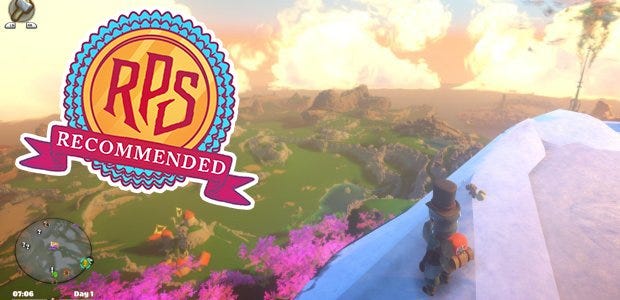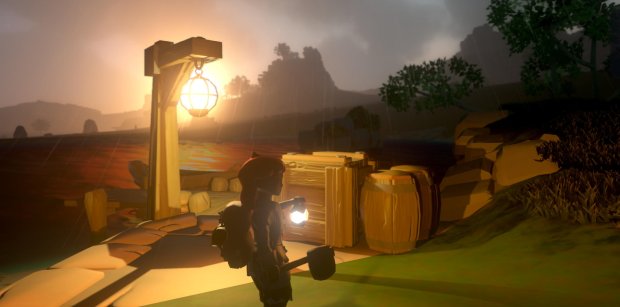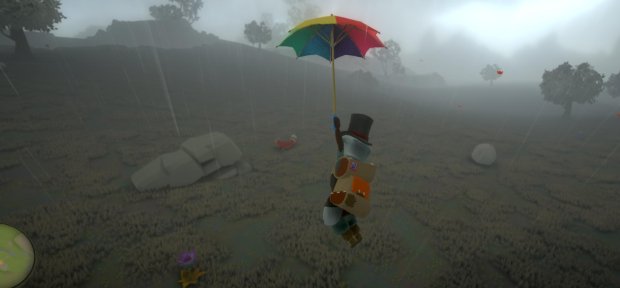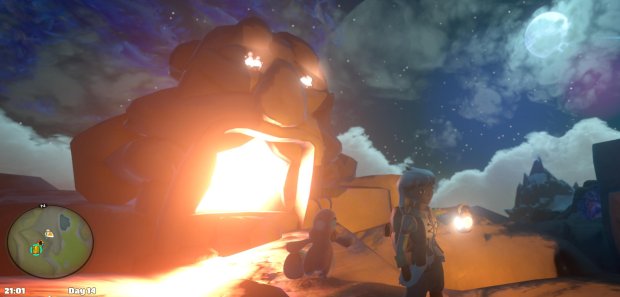Wot I Think: Yonder - The Cloud Catcher Chronicles
Breath Of The Tamed
Ignore the silly name, Yonder: The Cloud Catcher Chronicles [official site] is pretty special. A combat-free, risk-free game of exploration and meandering, farming and cat-gathering, questing and lazily fishing. Here's wot I think:
It's perhaps possible to be a little mercenary, and suggest that a lot of Yonder's design comes as a result of collecting together sticky elements from other games and putting them all together. Take a chunk of Zelda's grass-chopping item-scouring, a good spread of Harvest Moon's farming, a nice pile of Animal Crossing's village folk, a big stack of crafting from just about any survival game, and the quest structure of an MMO. And yet, while it absolutely is all those things, at no point does it ever feel cynical. It's far, far too lovely for that. It's teflon coated to protect it from cynicism. Believe me, I'm trying, and it doesn't stick. It's far, far too lovely.
Here's your premise: Blah blah shipwreck blah blah magic compass blah blah find something. I dunno. It really, really isn't that important. It might as well be "You are a Character. Your goal is to reach the goal." Because this is about the fun you have on the way. And it really is focused on fun, what with there not being even a teensy scrap of combat. (Indeed, not even a teensy scrap.) Instead it's about everything else your third-person Nintendoey action games tend to be - finding lost things, discovering new places, and gathering enough of something to gain access to somewhere else. Which likely wouldn't be enough were it not for the seamless inclusion of crafting, bartering, and building working farms with staff, animals, and produce.
You get your first farm pretty quickly, after being tasked with finding your way about the game's systems and locale, and then clearing a splodge of Murk - the Zelda-ish evil clouds that are occupying much of the land. To clear Murk you need Sprites - little fairy-like characters - in increasing numbers as you explore outward, which is the game's way of moderating your travel.
Get a farm and you can start building pens, troughs, and the like, then go off to woo wild animals to join you (feed them the item they like, then travel annoyingly slowly back to your farm as they follow). They'll then start producing goods for you to use or barter with. And indeed there are characters about the world who can be hired as hands. And here again it's rather pleasingly lovely how you do this - you bribe them with food. Hand over enough delicious grub and they'll come work for you. Eventually you'll discover how to plant crops, and even breed animals. And what's most amazing about all this: you don't need to.
That's the case with so much about Yonder. It's a giant space in which you can do the bits that interest you, when you want to do them. Fancy wandering around looking for missing cats? Go for it. Hunt for sprites to clear Murk - not a problem. Knuckle down and develop a farm, after pursuing the various careers that open up building opportunities? All yours. Or just spend hour after hour fishing in different spots of water to find the huge array of fish species.
All these opportunities intertwine pretty neatly, and to progress through various parts, or indeed make use of your hard work, you'll need to engage with Yonder's peculiar trading system.
Bartering is especially interesting, if completely daft. Instead of there being money in the world, you get new items or equipment from stores by swapping for items in your inventory. Once you've piled up enough of your goods to please the vendor, you can exchange. Which is a great idea, since that's in effect what all other games are doing really: you just sell the items you're "swapping" first, then pay with the resulting coins - rarely are you paid a wage. But it's daft, because the whole system works by labelling every item with its monetary value! Of course you need that, in order to more usefully know what to offer in exchange, rather than just guessing at items' worth, and indeed accidentally handing over something worth a million times more than what you're getting. So, in the end, you might as well be just selling... Oh, maybe not. You can certainly try to strike deals, by taking advantage of particular tastes of particular vendors (think No Man's Sky's way of having some buyers want to pay up to 100% more of something or other). But I do wonder if they really ought to have bitten the bullet, and perhaps labelled items with a colour-coded system, the familiar rarity symbols used in MMOs or similar, and then had you take the risk of not realising you were getting yourself a terrible deal at any given point.
Sadly the barter system becomes more problematic once your very limited (considering the innumerous items you hoover up as you play) inventory is full, and traders don't have anything you want or need. You end up having to ditch generic items for no reward, since you can't just sell them and keep the money for later. And ho boy, it is beyond infuriating that the game has backpacks for sale without making it clear they don't expand your inventory, and are purely decorative. The game so madly, desperately needs inventory expansions to the point where it's become the aspect that's kept this game at 'like' for me instead of 'love'.
Without a quick way to move items into extra storage, found at your farms, you end up having to scrap so much stuff you'll later need, just to be able to accept a quest, or open a chest. It is a constant bane, and one that could be so immediately and easily fixed.
Right, let me get my other big, significant moan out of the way, so I can get on with enthusing... Once you've got farms up and running, it starts to make some sense that there's marked progression of time - you need to remember to collect produce and check on things now and then. But unfortunately, as seems so infuriatingly often the case, here time passes ludicrously quickly. The real bane of this being that the game is about 75% less fun to play at "night", when, again like far too many games, it's just more difficult to see anything, rather than interesting or different to play. My rule has long been: your game's night needs to be as pretty and fun as its day, or you're not allowed to include it. Yonder falls far short of this requirement, and the night comes around so annoyingly fast. It's sometimes pretty at the right angle, but it's mostly just the same game with the lights off, making it irritating instead of fun for about a third of the time. I tend to spend night fishing, just to pass the time. Which is great until you realise you can't fit your catches in your inventory...
But there are so many neat ideas at play, with none more important than the game's emphasis on letting you explore and interact with its world in your own way, in your own time. And in exploring, you constantly uncover so much detail, and so many lovely surprises, delivered with an unusual modesty. I only discovered that it's possible to pretty up the night sky with discovered constellation stones by accident, and still after so many hours I'm stumbling on brand new animals. Much of the game's systems are surprises too, hence my trying to be a little evasive in describing a lot of what you actually do here.
And I love how smart it often is. For instance, the active quest text has a tiny arrow icon next to the specific items that rotates to point the way you should go! That's ingenious. That should be in every game. Indeed, selecting active quests is done not by a clicking on a boring list, but instead by opening your magic compass and scrolling through a boring list to make not-boring beams of light stream in the direction you'll then need to head (the lights go when you put your compass away, the but mini-map points the way).
Oh, and instead of allowing fall damage, your character automatically pops open a colourful umbrella and drifts gently down. And at night, the umbrella has its very own light inside. That this was created by a three-person team is utterly extraordinary, so bursting is it with the tiniest of lovely details. (A thousand extra points to the devs for hiding a reference to the "That's Not My..." series of Osborne books familiar to all parents of toddlers.)
It does feel a touch incomplete here and there. While launched as a finished game, there's definitely the air of late-stage early access to it, especially with promises of fixes and features in the game's Steam forums. Right now key elements like animal adoption in farms are pretty broken, and as I've outlined above, the bartering system and inventory don't feel like they've been exposed to enough sunlight before release. But at the same time, this is vast, intricate, and incessantly lovely.
Completely combat free, and you can't die (although it is VERY odd that your character can't swim, instead just walking deeper underwater until eventually the screen fades black and you're popped back on land - it's peculiarly maudlin!), so this is obviously not a game for those who approach their Zeldas with the desire for the bossfights. And it absolutely isn't going to offer anything close to the farming intricacies of a Harvest Moon or Stardew Valley. This is about something far more gentle, more laid back, where loveliness is the priority above all else. And that's not really a phrase that can be used too often in gaming, making it enormously worth celebrating here.
I've had such a splendid time just mellowing and wallowing in Yonder: The Cloud Catcher Chronicles, not needing to care why it has such a terrible name, not being rushed along, or nagged to do anything. Sure, I now want to also play a game that rushes me along and nags me to do things, ideally with a sword to swing around, but what a wonderful piece of balance Yonder offers. There are some big flaws, but I think they can be quite easily addressed. The larger question is whether you're looking for a game that isn't going to demand much from you, but rather offer you a place to hang out in relative solitude.
Yonder: The Cloud Chronicles is out now for PC for £19/$25/23€ (discounted to £15/$20/18€ at the time of writing) via Steam.










